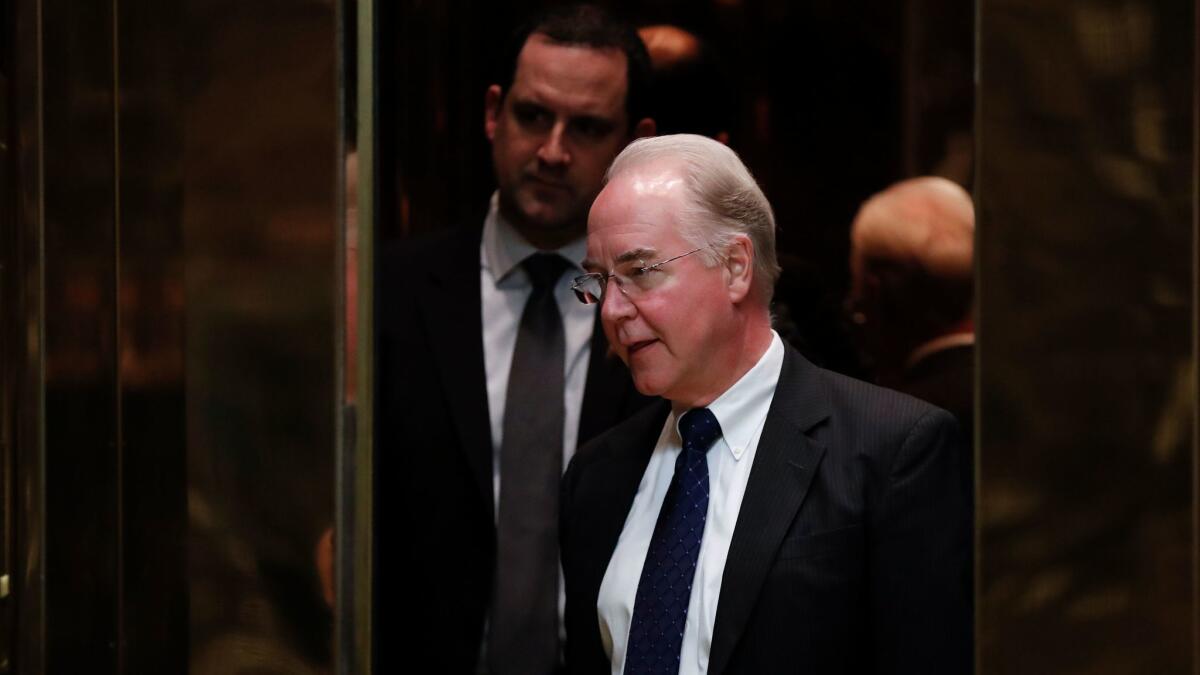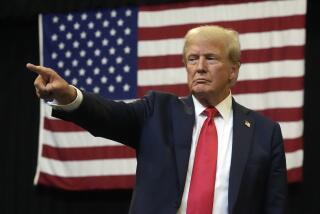Trump pledged to protect Medicare. His choice for health secretary has other ideas.

President-elect Donald Trump reassured voters during his insurgent political campaign that he would protect Medicare, Social Security and other popular federal assistance programs.
But in tapping Rep. Tom Price (R-Ga.) to be his Health and Human Services secretary, he has elevated one of the most aggressive proponents of dramatically overhauling the government safety net for seniors and low-income Americans, a long-held conservative goal.
Trump also took a step toward a potentially explosive political battle over the entitlements, which account for close to half of all federal spending.
Such a battle — and the threat of benefit cuts to more than 100 million Americans — risks alienating some of the very working-class voters who fueled Trump’s unexpected victory. His advisors and prospective Cabinet already include several figures whose wealth and political connections are at odds with Trump’s populist rhetoric.
“The pressure here will ramp up significantly,” warned John Lawrence, former chief of staff to House Minority Leader Nancy Pelosi (D-San Francisco), who has led numerous fights against GOP efforts in recent years to overhaul entitlement programs.
Even the smallest cuts in federal support can spark a backlash, Lawrence added, given people’s attachment to Medicare and other programs. “It can be $20, and they’ve got serious trouble on their hands,” he said.
Congressional Republicans voiced strong support Tuesday for Price, whom Senate Majority Leader Mitch McConnell (R-Ky.) called “the right person to lead the charge” to repeal Obamacare.
But Democrats moved quickly to highlight Price’s calls for more far-reaching entitlement changes.
“Washington Republicans are plotting a war on seniors next year,” said Sen. Charles E. Schumer (D-N.Y.), the incoming Senate minority leader.
Several Senate Democrats, including red-state lawmakers such as Indiana Sen. Joe Donnelly, announced they would vote against confirming Price. “Tom Price has led the charge to privatize Medicare, and for this reason, I cannot support his nomination,” Donnelly said.
Trump, in announcing his selection of Price, called the 62-year-old six-term congressman “exceptionally qualified to shepherd our commitment to repeal and replace Obamacare and bring affordable and accessible healthcare to every American.”
The president-elect did not mention Price’s calls for major changes to Medicare and Medicaid, which Price has made a centerpiece of his legislative agenda.
“Without changing course, America’s healthcare system will worsen with time, the nation’s federal health programs will either go bankrupt or contribute to the fiscal insolvency of the country at large, and Americans will lose access to the care they need,” Price warned in the 2017 budget blueprint he crafted as chairman of the House Budget Committee.
Price, like House Speaker Paul D. Ryan (R-Wis.), advocates replacing the government-provided Medicare health plan with a program that provides seniors with a voucher to purchase private health coverage.
This system, which supporters call premium support, saves the federal government money by gradually shifting costs onto beneficiaries, independent budget analyses have shown.
Price also advocates a new system of block grants to states that would sharply cut federal aid for Medicaid, which primarily serves poor Americans.
Conservatives have argued for decades that Social Security, Medicare and Medicaid, the mammoth government entitlement programs for the elderly, disabled and poor, are unsustainable.
But the three entitlements, which cost more than $2 trillion annually, remain extremely popular, unlike the divisive Affordable Care Act, as Obamacare is formally known.
“Medicare is not seen as the same type of issue as the ACA,” Harvard University political scientist Robert Blendon, an authority on public opinions of healthcare, explained at a recent forum by the Alliance for Health Reform. “Most voters of both parties think Medicare is working.”
Even Medicaid, which began as a welfare program, and the related Children’s Health Insurance Program have established strong bipartisan support, reflecting in part the large role they play in providing coverage to children and elderly Americans in need of nursing home care.
Nearly two-thirds of Americans said that Medicaid is a “very important” government program in a 2015 national survey by the nonprofit Kaiser Family Foundation. That was only slightly below Medicare, which was rated similarly by 77% of Americans, and Social Security, which 83% of respondents said was very important.
The depth of that public support has prevented Republicans from making major changes to the programs over the years.
President Bush’s 2005 push to privatize Social Security not only was defeated, but helped reenergize Democrats and fueled the party’s return to power in Congress in the 2006 midterm election.
Trump appeared to grasp this on the campaign trail.
Though he did not discuss healthcare and entitlement policies frequently, Trump insisted several times that he would protect programs serving vulnerable Americans.
“I’m not going to cut Social Security like every other Republican, and I’m not going to cut Medicare or Medicaid,” Trump said last year in an interview with the Daily Signal, an online news site operated by the conservative Heritage Foundation.
“Every other Republican is going to cut, and even if they wouldn’t, they don’t know what to do because they don’t know where the money is. I do,” Trump said.
But the president-elect has offered few details about his healthcare agenda, including his plans to replace the 2010 Affordable Care Act.
And many in Washington are still trying to figure out whether Trump will align himself with the conservative governing program that has been championed by Price, Ryan and other congressional Republicans in recent years.
“All of Trump’s nascent positions were opening gambits in a deal,” said Rick Tyler, who was an aide to former House Speaker Newt Gingrich (R-Ga.). “It’s always a negotiating position with him.”
Trump has indicated a willingness to forge an alliance with Democrats over infrastructure spending, a top policy goal that could find him clashing with fiscal conservatives in his party.
That made his choice of Transportation secretary, Elaine Chao, particularly noteworthy. In addition to serving eight years as President George W. Bush’s Labor secretary, Chao is married to McConnell, a key negotiator in any spending plans Trump would put forward.
Chao’s establishment ties conflict with Trump’s promise to “drain the swamp” in Washington and promote outsiders to lead his government. But Chao’s connections could be an asset as he makes the case for fixing dilapidated airports, roads and bridges.
Chao’s tenure at the Department of Labor included criticism from some advocates that she sided with employers on enforcing safety standards and failed to adequately protect low-wage workers. Chao rejected those assertions.
But the pick was greeted with cautious optimism by Democratic leaders. Schumer said Democrats are eager to work with Chao “if President-elect Trump is serious about a major infrastructure bill, backed by real dollars and not just tax credits and without cutting other programs like healthcare and education.”
Twitter: @noamlevey, @noahbierman
Video playlist: The Trump Transition
More to Read
Sign up for Essential California
The most important California stories and recommendations in your inbox every morning.
You may occasionally receive promotional content from the Los Angeles Times.











